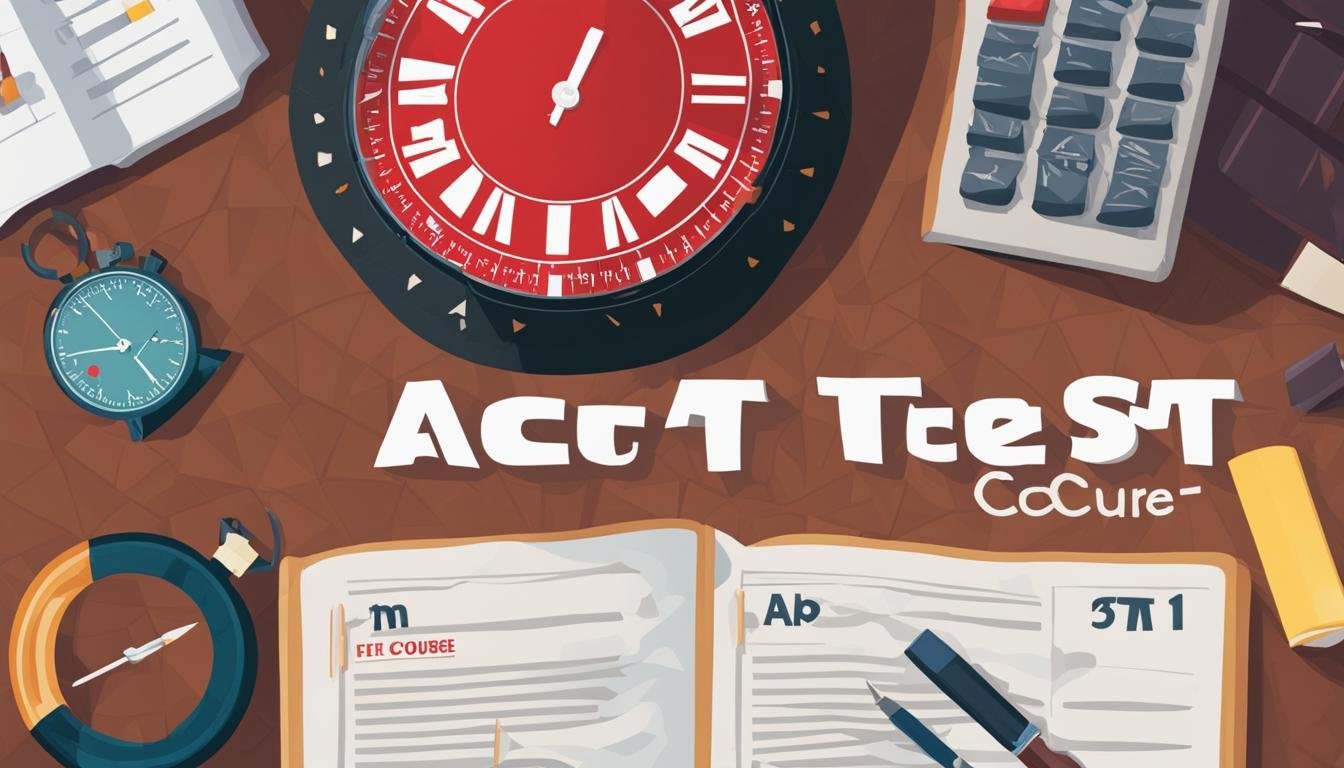The ACT is a college readiness assessment that plays a significant role in the college admissions process. To succeed on the ACT, it is essential to understand its duration, sections, and how to prepare effectively.
Key Takeaways:
- The ACT consists of four multiple-choice tests: English, mathematics, reading, and science.
- The test duration is 3 hours (2 hours and 55 minutes without the optional writing test) with a 15-minute break after the mathematics section.
- Each section has a different number of questions and time limit.
- Arrive on time with all necessary materials, including admission ticket, photo ID, pencils, calculator, and a snack for the break.
- Preparation should involve reviewing the test format, identifying areas for improvement, and practicing with sample questions.
What to Bring on Test Day

On test day, it is important to come prepared with the necessary materials. Here is a list of items that students should bring:
- Admission Ticket: Students should bring their admission ticket, which can be printed from the MyACT website after uploading a photo. This ticket is required for admission to the test center.
- Acceptable Photo Identification: Students must have acceptable photo identification that meets ACT requirements. Without proper ID, students will not be allowed to test.
- Number 2 Pencils: No mechanical pencils or ink pens are allowed, so students should bring number 2 pencils with good erasers.
- Watch or Timing Device: A watch or timing device can be used to pace oneself during testing. However, it must be removed and placed on the desk during the test.
- Permitted Calculator: A permitted calculator can be used on the mathematics test, but it is not required.
- Snacks: Students can bring snacks to eat outside the testing room during the break. However, be sure to check the ACT guidelines for any specific restrictions on food items.
It’s important to note that some items are prohibited and should not be brought to the test center. These include textbooks, dictionaries, scratch paper, electronic devices (except for a permitted calculator and watch or timing device), reading material, and tobacco. Make sure to review the ACT guidelines to ensure compliance on test day.
ACT Timing Tips

Managing time effectively on the ACT is crucial for achieving a high score. With proper time management strategies, students can navigate each section of the test efficiently and complete all questions within the given time limit. Here are some helpful tips to pace yourself during the ACT:
- Know the time allocation for each section: Familiarize yourself with the time limits for each section of the ACT. This will help you allocate your time wisely and ensure that you don’t spend too much time on any one question.
- Practice time-based drills: Incorporate timed practice sessions into your ACT preparation. Set a timer for the designated time limit for each section and challenge yourself to complete as many questions as possible within that time. This will help you build speed and efficiency in answering questions.
- Don’t dwell on difficult questions: If you encounter a particularly challenging question, it’s important not to spend too much time on it. Quickly move on to the next question and come back to it later if you have time remaining.
- Utilize shortcuts and strategies: Familiarize yourself with strategies and shortcuts for different sections of the ACT. For example, in the math section, identify the easier questions and solve them first, leaving the more time-consuming ones for later.
Test Section Timing
Each section of the ACT has a specific number of questions and a fixed time limit. It’s essential to budget your time accordingly to ensure you have enough time to complete all the questions. Here is a breakdown of the time limits for each section:
- English: 75 questions in 45 minutes
- Mathematics: 60 questions in 60 minutes
- Reading: 40 questions in 35 minutes
- Science: 40 questions in 35 minutes
By familiarizing yourself with these time limits, you can create a plan for how much time to allocate to each question and section. Remember to practice diligently and implement time management strategies to optimize your performance on the ACT.
Test Day Tips

In order to have a smooth experience on test day, it’s important to be well-prepared and follow the instructions provided by the test center. Here are some essential tips to help you navigate through the ACT test day:
- Arrive at the test center on time: It is recommended to arrive at least 20-30 minutes early to allow for check-in procedures and to settle in before the test begins.
- Follow test day preparations: Dress comfortably and in layers to adapt to different room temperatures. Make sure to have a good night’s sleep and eat a healthy breakfast to ensure optimal performance.
- Listen carefully to instructions: Pay close attention to the instructions provided by the test proctors and ask questions if anything is unclear. It’s important to have a clear understanding of what is expected during the test.
- Maintain appropriate behavior: During the test, focus solely on your work and avoid any prohibited behavior. Cellphone or electronic device use is strictly prohibited during breaks, so be sure to adhere to these rules.
After completing the test, if time allows, take a few moments to review your answers. However, it’s important to note that once you leave the test center, you will not be able to re-enter to review any completed sections. If you do not want your test to be scored, inform a testing staff member before leaving the test center.
By following these test day tips, you can help ensure a successful and stress-free ACT experience. Remember to stay focused, manage your time effectively, and stay confident throughout the test.
Conclusion
The ACT test is a crucial step in preparing for college admissions. To succeed on the ACT, it is essential to invest time and effort in thorough preparation. By reviewing the test format and practicing with sample questions, students can become familiar with the structure and content of the test.
On test day, proper planning and organization are key. Arriving at the test center on time, bringing the required materials, and following test center protocol are essential steps for a smooth testing experience. Students should also prioritize time management during the test, ensuring they pace themselves well and allocate sufficient time to each section.
By implementing these test day tips and strategies, students can optimize their performance on the ACT. Remember, proper preparation and adherence to test center guidelines will contribute to a successful test experience. Good luck!
FAQ
How long is the ACT test?
The ACT test is 3 hours long, or technically 2 hours and 55 minutes. If students choose to take the optional writing test, the total testing time is 3 hours and 40 minutes.
What are the sections of the ACT test?
The ACT test consists of four sections: English, mathematics, reading, and science.
How many questions are in each section and how much time is given?
The English section has 75 questions to be completed in 45 minutes, the mathematics section has 60 questions to be completed in 60 minutes, the reading section has 40 questions to be completed in 35 minutes, and the science section has 40 questions to be completed in 35 minutes.
What materials should I bring on test day?
On test day, it is important to bring your admission ticket, acceptable photo identification, number 2 pencils, a watch or timing device, a permitted calculator (for the mathematics test only), and a snack for the break.
Can I bring a calculator?
Yes, a permitted calculator can be used on the mathematics test, but it is not required.
What should I not bring on test day?
Some items are prohibited and should not be brought, including textbooks, dictionaries, scratch paper, electronic devices (except for a permitted calculator and watch or timing device), reading material, and tobacco.
How should I manage my time during the ACT test?
It is important to familiarize yourself with the timing of each section and practice pacing yourself to ensure you can complete all the questions within the allotted time.
What should I do on test day?
On test day, arrive at the test center on time, dress comfortably, listen carefully to instructions, focus on your work, avoid prohibited behavior, and carefully review your answers if time allows.
Source Links
- https://www.act.org/content/act/en/students-and-parents/high-school-success/testing-advice-for-the-act/tips-to-taking-the-act.html
- https://www.act.org/content/act/en/products-and-services/the-act/test-day.html
- https://www.princetonreview.com/college-advice/how-long-is-the-act


